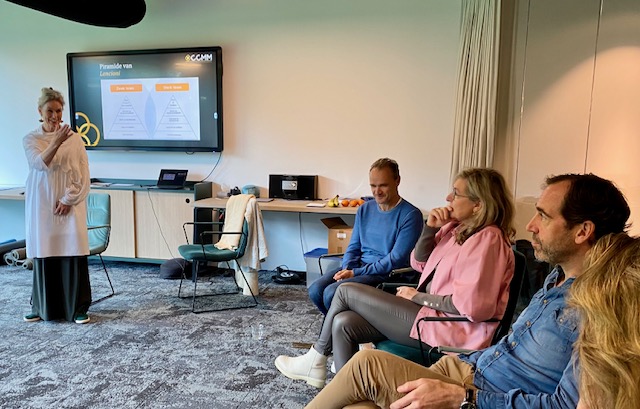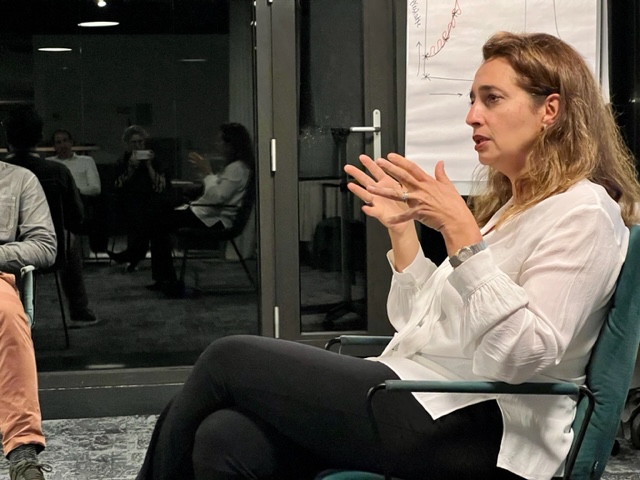Today, I find myself in the serene suburbs of Utrecht, where I’m attending a continuing medical education course on compassionate leadership in healthcare settings. Our backdrop for this transformative journey is the picturesque Landgoed de Horst campus in Driebergen, where inspiring quotes adorn the paths that wind between modern structures. As I introduce myself and distribute name tags to my fellow participants, it becomes evident that we comprise a remarkably diverse group of specialist doctors and one specialist nurse, all congregated for this enlightening three-day seminar. Among them, I’m the youngest healthcare professional, freshly graduated from medical school, and honored to assist my friend and mentor, Barbara Doeleman-van Veldhoven, who leads the course.
Amidst the bustling activities and workshops unfolding in neighboring rooms, our energy might be somewhat subdued after a busy, rain-soaked morning, compounded by the sea of unfamiliar faces surrounding us. But as Barbara offers a brief introduction, a sense of stillness envelops our room, and we commence with a short meditation. After just five minutes of guided meditation and synchronized deep breathing with strangers, I open my eyes. The transformation is palpable, and I now find myself fully present, eager to absorb the wisdom this experience promises. A glance around the room reveals that this sentiment is shared by my fellow attendees.
We dive straight into the day’s agenda with icebreakers that encourage us to break down the barriers of self-perception. These activities challenge us to articulate our own thoughts and truly listen to the voices of our newfound companions. As we engage in these exercises, the passage of time seems to accelerate, and the bell signaling the next round arrives too soon, leaving us wanting more. By the end of these rounds of thought-provoking games, I am invigorated and have formed connections with my fellow participants. Through these moments of reflection and the courageous act of expressing my true self, I get a sense that I am discovering aspects of my identity that were previously concealed. Yet, I cannot help but ponder if I truly knew myself as well as I believed before embarking on this extraordinary journey.

We then embark on a brief meditation session, designed to calm our thoughts and assimilate the knowledge we’ve just shared. The resonant chime of a singing bowl signals the end of our meditation, and as I open my eyes, I’m greeted by a sea of content, smiling faces. It’s a refreshing contrast to what I would typically anticipate when sitting amongst a group of seasoned medical specialists. Usually, I’m focused on making a good impression rather than embracing vulnerability. I reflect that this sense of safety might be influenced by the unique composition of this gathering, prompting me to ponder how this nurturing environment could be extended across the broader healthcare system.
Barbara skillfully seizes our attention, delving into the essence of compassion, prompting us to contemplate its true nature. According to Barbara, compassion is not merely a sentiment; it’s a verb. It differs from empathy in its proactive pursuit of reducing suffering, whether it’s one’s own or that of others. It transcends sympathy and pity in its transformative power. Barbara also delves into the subject of leadership, the complementary facet of our course. She highlights the multifaceted role of a leader, including providing direction, facilitating effective coordination, and nurturing open communication and unwavering commitment within a team.
As my mind wanders to personal instances where these principles have been achieved, Barbara smoothly transitions to a critical element in cultivating compassionate work environments and effective leadership: psychological safety. This concept, rooted in organizational psychology, centers on a shared belief held by team members – the belief that the team is a haven for interpersonal risk-taking. In practical terms, it means that individuals within the team feel at ease to express their thoughts, raise questions, and share ideas, even when these ideas might be unconventional or unpopular. This foundation of psychological safety is fundamental to fostering a culture of compassion and effective leadership within healthcare settings.
Psychological safety
As Barbara articulates the concept of psychological safety, I find myself silently nodding in agreement. It’s like she’s revealed the elusive missing piece of the puzzle, a concept that, in hindsight, seems glaringly obvious. I can’t help but think, “If only we weren’t constantly under the pressure of time constraints, especially in healthcare environments.” Our stimulating morning session draws to a close, and I can’t shake the echo of Barbara’s words: “Leadership begins in the mind of the leader.” Stomachs collectively growling, we venture out into the common area to locate the mess hall. The ground staff welcomes us with a delectable lunch, providing a brief respite from the day’s intense discussions. It’s an opportunity to connect with one another in a more relaxed, informal setting. Barbara, sharing in the laughter and conversations, remains right by our side. The atmosphere is charged with hope and inspiration. As we nourish our bodies and engage in casual conversation, we prepare for the next segment of the day, eagerly anticipating the insights of the two guest speakers whom Barbara has thoughtfully invited to share their expertise.
Returning to our meeting room, we kick off with a brief group meditation to ease into the afternoon’s program. When the bell signals the end of the meditation, Barbara introduces her friend and colleague, Marieke van Voorn, an organizational psychologist and the author of ‘Healing Organizations’ and ‘Healing Society.’ Marieke shares insights into her work, particularly her endeavors to promote the themes discussed in the morning throughout Dutch working culture. However, the session swiftly evolves into an interactive discussion on equality, healthy independence, hierarchy, co-dependency, and their pertinence to psychologically safe work environments and compassionate leadership.
Marieke invites the group to contribute real-world examples for analysis and potential solutions. Some attendees are hesitant to share their challenges, while others are enthusiastic, even desperate, to gain an external perspective on their workplace issues. Although not all issues are easily resolved within the brief hour, the conversation plants the seeds for future progress.
Selfcompassion
Barbara takes center stage once more for her final afternoon session, focusing on the significance of self-compassion in compassionate leadership. We delve into the realms of psychology, physiology, and brain anatomy, exploring the neuroscience of arousal and stress, the role (and dysfunction) of the amygdala, and the pathways and consequences of sympathetic arousal, along with the fight, flight, or freeze response. Barbara goes even further, sharing recent research indicating that some individuals, primarily women, may respond differently, exhibiting a tend-and-befriend response to stress. This revelation brings me back to the pervasive stress levels in healthcare settings and the rapid transformation of work environments into toxic spaces. In my thoughts, I ponder the potential benefits of more time and space for meditation and relaxation for healthcare professionals. Amid these reflections, a clear message surfaces: shift the focus away from what others are doing or what the workplace may lack. Instead, safeguard your energy and strive to lead with compassion. Barbara concludes her final segment with a powerful reminder: “When stress increases, compassion decreases; when compassion thrives, stress recedes.” The session concludes, and we transition to dinner in a manner reminiscent of our lunchtime gathering.

Vulnarability & honesty
The sun has set outside, and inside the room, Shirin Bemelmans-Lalezari, a Dutch cardio-thoracic surgeon, stands before a captive audience. She informs us that she has a story to share, one that delves into the gravest mistake of her entire career. In the world of healthcare, as in any profession, honesty and the willingness to admit to mistakes are pillars of workplace improvement. It’s in the vulnerability of acknowledging our shortcomings that we find the true potential for growth. The ability to address errors, learn from them, and transparently communicate them to colleagues fosters an environment where trust, progress, and innovation can thrive. While Shirin recounts her heart-wrenching story, the repercussions it wrought and the unexpected positivity that her approach yielded, my mind loops back to the notions of psychological safety discussed earlier in the day. Shirin’s experience underscores that even when something unfortunate occurs due to mistakes, there remains the potential for a silver lining. While our gut reaction may be to hide our mistakes and shortcomings, admitting to them allows for the implementation of positive changes, fostering an environment of growth and compassion. Mistakes happen, and in the ever-evolving realm of healthcare, where lives are at stake, the significance of this culture of honesty cannot be overstated. It’s a testament to our commitment to providing the best care possible and continually striving for excellence.
As the day draws to a close, we find ourselves enriched with knowledge, energized by introspection, and inspired by the potential for change. Today’s journey into compassionate leadership in healthcare has ignited a spark within us, fostering connections, and planting seeds of growth. I return to my room and look forward to what tomorrow will bring as we continue to explore the profound impact of compassion and leadership in our ever-evolving healthcare landscape.
I’ll keep you posted.
With warm regards, Marc Daniël Mazur

